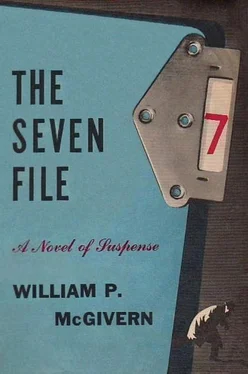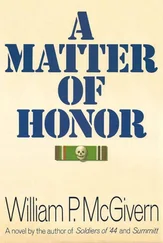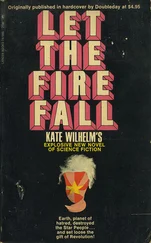William McGivern - The Seven File
Здесь есть возможность читать онлайн «William McGivern - The Seven File» весь текст электронной книги совершенно бесплатно (целиком полную версию без сокращений). В некоторых случаях можно слушать аудио, скачать через торрент в формате fb2 и присутствует краткое содержание. Город: New York, Год выпуска: 1956, Издательство: Dodd, Mead & Company, Жанр: Криминальный детектив, на английском языке. Описание произведения, (предисловие) а так же отзывы посетителей доступны на портале библиотеки ЛибКат.
- Название:The Seven File
- Автор:
- Издательство:Dodd, Mead & Company
- Жанр:
- Год:1956
- Город:New York
- ISBN:нет данных
- Рейтинг книги:4 / 5. Голосов: 1
-
Избранное:Добавить в избранное
- Отзывы:
-
Ваша оценка:
- 80
- 1
- 2
- 3
- 4
- 5
The Seven File: краткое содержание, описание и аннотация
Предлагаем к чтению аннотацию, описание, краткое содержание или предисловие (зависит от того, что написал сам автор книги «The Seven File»). Если вы не нашли необходимую информацию о книге — напишите в комментариях, мы постараемся отыскать её.
The Seven File — читать онлайн бесплатно полную книгу (весь текст) целиком
Ниже представлен текст книги, разбитый по страницам. Система сохранения места последней прочитанной страницы, позволяет с удобством читать онлайн бесплатно книгу «The Seven File», без необходимости каждый раз заново искать на чём Вы остановились. Поставьте закладку, и сможете в любой момент перейти на страницу, на которой закончили чтение.
Интервал:
Закладка:
The radio on Inspector West’s desk cracked through a tense silence, and Roth sat up quickly and leaned toward the speaker, his face hard with strain and fatigue.
A voice said, “Davis, Philadelphia office. Subject crossed the Memorial Bridge a few minutes ago, on the approach to the New Jersey Turnpike.”
“Okay,” Roth said.
“I’m turning off now.”
“Good work, Davis.”
Roth glanced up at West who was sitting on the edge of the desk with an unlighted cigarette in his mouth. The days of strain had drawn lines of exhaustion in his lean, youthful face, but his eyes were hard and bright as marbles.
“Looks like he’s coming back to New York,” Roth said.
West nodded slowly, and glanced at the clock.
The radio sounded again, and a voice said, “This is Brandell, Philadelphia. Subject is on the Turnpike. I’m going to pull ahead of him. He’s doing forty-five. I’ll check off in ten or twelve miles.”
“Right, Brandell,” Roth said.
West stood up, glancing at the clock again; it drew his eyes like a magnet. It was three o’clock Wednesday morning. Time was working against them now; each minute that passed lengthened the odds against the baby. The ransom had been paid, the kidnapers had their money. Now the baby became dangerous and incriminating excess baggage. A nuisance... Why risk taking her home? That would be the question they’d put to themselves. And West knew how they would answer it...
The FBI had covered the payoff for that reason — hoping that the pickup car would lead them to the baby. More than a hundred cars, trucks, cabs and station wagons had participated in the coverage — even a few motorcycles. Creasy had been followed leaving Kennett Square, Pennsylvania by a relay of cars, working on a split-second schedule. Bradley’s convertible had been equipped with a radio transmitter and camera by agents from the Philadelphia office. When Creasy had pulled up behind him Bradley had touched a foot pedal — and the camera had recorded Creasy’s license plates, and the transmitter had thrown one signal to the cordon of agents who were patrolling the secondary roads that ran parallel to Highway One.
It was an intricate maneuver, demanding perfect timing and synchronization from the dozens of agents participating in the surveillance. And it had been brought off flawlessly. Now Creasy was apparently returning to New York with the money. And time was running out...
West threw his unlit cigarette aside with an abrupt, angry gesture. He stared at the two blown-up photographs on his desk: Duke Farrel and Howard Creasy. Where in the name of God was Farrel?
A half-dozen agents sat at the desks surrounding West’s long table. They were waiting for phones to ring, teletype keys or radio signals to break the silence; the nets had been cast wide — to Chicago, Madison and Detroit, south to Mobile, as far west as Colorado, to any place where there might be a lead on the Farrel brothers.
An agent had talked to the younger brother’s commanding officer, a retired colonel living in Red Bank, New Jersey. Another had spent three hours at Joliet Penitentiary, talking with the warden and trustees who had known Duke Farrel.
They had the two brothers in sharp relief now; army service, prison record, credit ratings, hobbies, tastes in food, clothing, women — that had all gone into the file. They didn’t have much on Creasy, but a file was growing on one Edwin David Grant, a seasoned Chicago hoodlum who had been an intimate of Duke Farrel’s in prison. They had been around Chicago for a while after being released from jail, and had gone on together to Detroit, and later to Denver. There the trail ended, there was nothing to indicate that Grant was with Farrel now...
Roth said, “I’ll be surprised if the younger brother is in on it.”
“You can’t tell,” West said.
Roth picked up a card from the desk. “He doesn’t fit. Two decorations, damn fine record, and you know what his CO thinks of him — it just doesn’t fit.”
“We’ll see.”
They knew that Henry Farrel lived and worked in Portland, Maine, as a junior partner in a real estate office. Agents had checked his apartment, but found it empty; he was away on a fishing trip in Canada, but his secretary didn’t know just where.
“It could fit,” West said. “Maybe the Farrel brothers met in Canada.”
“Sure,” Roth said, dropping the card back on the table. “I’ll be surprised though.”
There was nothing to do but wait. Everyone in the room looked up when the radio broke the silence with a periodic report on Creasy’s approach to New York. And occasionally, with almost furtive glances, they watched the relentless sweep of the second hand around the face of the clock.
At three-thirty the phone on West’s desk rang. He picked up the receiver and said, “Yes?” in his sharp official voice. Then: “Yes — certainly I’ve got time. What is it?” His voice was almost gentle then; the crisp official note was gone. Roth glanced up as he said, “Well, that’s fine news, absolutely great. I’ll get word to him... yes, of course. He’ll be — well, he’ll be just as happy as you are.”
West put the phone down and said to Roth, “There’s one break. That’s Crowley’s wife.”
“The baby’s okay?”
“Not okay. It’s polio, but a mild case, she says. The doctors feel sure the child is in no real danger.”
“How about the after-effects?”
“She just said the baby’s going to live. She’s taking the bridges one at a time.” He put another cigarette in his mouth. “Give Crowley a flash. He’s standing by...”
It was four o’clock when the direct phone to Chicago began to ring. An agent lifted the receiver, then glanced at West. “For you, sir. Agent-in-charge, Chicago office.”
West took the receiver and said, “Yes?”
“Jim Keely, Tom. We’ve got another line on Duke Farrel. I can’t vouch for it. It’s third-hand. But you can run it down. One of our sources here just phoned me. He came across a bookmaker who had a letter from Duke Farrel. He was in New York then, staying at either the Wells Hotel or the Bell Hotel — the bookie wasn’t sure.”
“When was this?”
“About a month ago. Farrel was in to the book for a couple of hundred bucks, and they were after their money. He wrote that he’d be in Chicago in six weeks and straighten it out then. That’s all we’ve got.”
“It may help,” West said. “Thanks, Jim.”
When he put down the phone Roth stood and said, “What is it?” The other agents had come to their feet, too, and were watching him with alert eyes.
“The Wells Hotel, or the Bell Hotel,” West said. “Farrel was at one of those places a month ago. Do you know them?”
“I know the Wells,” Roth said. “On Forty-seventh Street between Fifth and Sixth. It’s a trap. Vags, hustlers, horse players, that sort of thing.”
“The Bell is up in Harlem,” another agent said. “It’s run by some kind of a mission. You’ve got to be a member of the church to stay there.”
“The Wells sounds right,” West said. “We’ll try it first.”
“What do we do?” Roth said. He had already put on his coat; he was tense, ready to go, his big face hard and mad. “Take it apart brick by brick? Give the clients a memory lesson?”
“Farrel might have friends there,” West said.
“I’ll bet he does. And I’ll bet they know where he is.”
“We can’t go in with sirens,” West said.
“Someone in that hotel may have a lead for us,” Roth said, and unconsciously his eye shifted to the clock. “I’d like to bust it loose. While there’s time.”
“Yes, and someone there might be on the phone to Farrel ten minutes later,” West said. “The bellhop, the night desk clerk, elevator man — any one of them might be in on this deal.”
Читать дальшеИнтервал:
Закладка:
Похожие книги на «The Seven File»
Представляем Вашему вниманию похожие книги на «The Seven File» списком для выбора. Мы отобрали схожую по названию и смыслу литературу в надежде предоставить читателям больше вариантов отыскать новые, интересные, ещё непрочитанные произведения.
Обсуждение, отзывы о книге «The Seven File» и просто собственные мнения читателей. Оставьте ваши комментарии, напишите, что Вы думаете о произведении, его смысле или главных героях. Укажите что конкретно понравилось, а что нет, и почему Вы так считаете.











